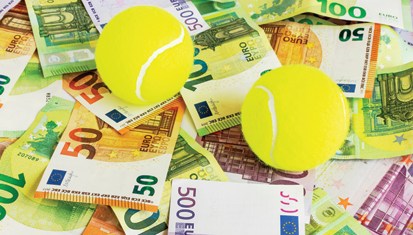Revealed: economic impact of COVID-19 on UK sport industry: four nations may shoulder second highest fall in sport-related GDP across Europe
Revealed: economic impact of COVID-19 on UK sport industry: four nations may shoulder second highest fall in sport-related GDP across Europe Primary tabs
COVID-19 recovery in 2021 must not overlook the sport sector, according to a study by independent research institute Ecorys that outlines for the first time the potential impact of the pandemic on the industry in the UK and Europe.
Mapping study on measuring the economic impact of COVID-19 on the sport sector in the EU was commissioned by the European Commission’s Directorate General for Education, Youth, Sport and Culture (DG EAC) and carried out by Ecorys and sport economics non-profit SportEconAustria (SpEA).
Under the most likely scenario for 2020, the report estimates that the UK will experience the second largest fall in sport income out of all the 28 countries covered, 9.5 billion Euros (£8.6 bn), nearly 17% of the total decline across Europe. UK sport-related job losses may total 250,000 (23% of all sport job losses in Europe). The biggest drop in sport-related GDP in 2020 is projected to be in Germany, which may lose almost 23 billion Euros (40% of the EU total).
Across Europe, the impact of COVID-19 across the sport sector may result in a drop of almost 60 billion Euros (£52bn) in GDP and a loss of over a million employees.
The study analyses the cost of the compulsory closure of stores, sport clubs and gyms as well as the cancellation of events. It also outlines the indirect, negative financial consequences for sport services such as tourism, transport, accommodation and sport media.
The report highlights the immediate need to strengthen the sector, reflecting its role in communities and in improving public health. Sport-related organisations have a part to play in shaping national and local socio-economic policy and strategy, for example, when reconfiguring city spaces or rebuilding the tourism trade.
The impact on the sector includes:
- lost revenue from membership, licensing, participation, ticketing, broadcasts, sponsorship, or sales and subscriptions
- cash flow difficulties including paying wages, rents and contracts
- lack of employment security and income as well as job cuts and loss of skills among staff, athletes, coaches and freelance workers
- a negative effect on volunteering, with unpaid staff unable to participate in events even after lockdown, due to continued restrictions on movement.
Recommendations for public authorities, governing bodies, national federations and sporting organisations include:
- embedding sport in national and local strategies
- developing cross-sector links, for example, with health or tourism
- promoting economic data on the role of sport
- supporting information sharing and the coordination of events across Europe
- publicising funding streams
- developing broader emergency preparedness plans
The report includes detailed case study examples of how COVID-19 is affecting a range of sport-related organisations, and outlines potential actions.
“Among the case studies is the Federation of the European Sporting Goods Industry (FESI), which represents 1,800 sporting goods manufacturers (85% of the European market), including major companies operating in the UK. In total, the European sporting goods sector employs over 700,000 people and has an annual turnover of EUR 81 billion. More than 55% of FESI members have lost turnover comprised between 10 and 30% for the whole of 2020 (compared to 2019), due to various factors including stores shutting, a decrease in demand and a drop in tourism. FESI is calling on the EU Member States to coordinate their sanitary measures and to provide the sporting goods sector with cash flow support and to reduce the tax burden on businesses.”
Diarmid Campbell-Jack, Associate Director at Ecorys said “Our research exposes for the first time the potentially significant impact of COVID-19 on the UK sports sector. Our findings also show the strong next steps necessary given the important socio-economic contribution of the sport sector and its role in communities, public health and wellbeing.”
Anna Kleissner, Managing Director of SportsEconAustria said: “As confirmed in this study, there is no doubt that the sport sector is one of the sectors hardest hit by COVID-19. It is not just elite sports and major events that will be affected, with the UK and countries across Europe needing to take measures to maintain the structures that have been established in both grassroot and professional sport.”
Notes for editors:
The full report is available on the European Commission website here. The study and UK findings have been the focus of a short webinar which is available here.
For further information, contact Diarmid Campbell-Jack (Associate Director, Ecorys) here
Models were developed for three different scenarios depending on the likely impact of COVID in 2020 (higher, medium, lower). Data is shown below for the “higher” scenario as this is the most likely given the extent of the pandemic. All data in this document is based on the direct impact – total data including the additional indirect impact on the wider value chain is included in the report.
Table 1: Direct impact of COVID-19 in “higher” scenario
|
EU level |
Sport-related GDP |
Sport-related employment |
||
|
|
Million Euros |
Percentage of sport-related GDP |
Employees in persons |
Percentage of sport-related employment |
|
UK |
9,500 |
18.0% |
254,753 |
20.6% |
|
EU-28 |
56,930 |
15.7% |
1,099,526 |
17.0% |
In addition to the economic modelling, the study involved two separate surveys of sport stakeholders across Europe, one providing economic information (148 responses) and the other examining possible measures or initiatives to help the sport sector deal with the pandemic (115 responses). An additional set of twenty interviews were also conducted with stakeholders to provide in-depth information on key measures.

19 September 2021
8 minute read


